Open Knowledge International Annual Report
Looking back on 2016Message from the CEO
How can we continue to ensure citizens have access to the best available data to address today’s most pressing issues? What kinds of data are most useful for tackling these issues? These are some of the questions we’ve been asking ourselves at Open Knowledge International over the last year and that continue to guide our work.
In 2016 we played a vital role in providing wider access to quality data and building momentum for open data. We are more determined than ever before to strengthen our efforts and our community to ensure data is not only available, but is being used in innovative and useful ways. We’ve spent considerable time over the last few months refining our mission: to empower civil society organisations to use open data to improve people’s lives.
Today, citizens have access to more data from their governments than ever before. The open data community has made great strides in improving the availability and accessibility of datasets. But as the Global Open Data Index has shown, there is still much more work to be done to encourage governments to provide this information.
We also know that quantity is not enough - open data is only valuable insofar as it is useful and relevant to the concerns of citizens. We worked steadfastly in 2016 to build tools and capacity to help individuals and organisations access the data they need. The milestones we’ve achieved this year with School of Data, OpenTrials and the Africa Open Data Collaboration Fund, to name just a few, have been excellent examples of our commitment to improving the role of data in society.
In 2016 we began to focus more of our efforts on improving the quality of data. We are proud of the achievements of our OpenSpending team and their work with governments to standardise fiscal data. On September 8, 2016, Mexico became the first country to formally adopt the Open Fiscal Data Package, an international open data standard we collaborated to create (and built with cross-team support from our forward-thinking Frictionless Data project).
As we build on this momentum and extend our reach and influence in other areas, we want to take some time here to look at what we have achieved in 2016 and the range of activities we were involved in. We also want to share with our community what we have learned in the process and some new directions for the organisation going forward.
In 2016, we launched useful tools, trained groups and individuals to use open data in exciting ways, and worked with a number of new partners. We participated in and led workshops on the role of data in society. We spun-off our commercial services arm to Viderum, ensuring our focus can remain strong on civil society organisations. We expanded and strengthened our global Open Knowledge Network and wider community. We would especially like to thank those who funded us during this reporting period.
2017 is already off to a great start with the announcement of a two-year grant from Omidyar Network to support the implementation of our civil society-focused strategy. And for a sneak preview of things to come, why not read our white paper on why we want to create a public database of multinational tax contributions or take a look at how public data is fostering civic engagement in cities.
Pavel Richter - CEO
For: The Open Knowledge International Team
Highlights from our projects
Global Open Data Index
The Global Open Data Index (GODI) measures and benchmarks the openness of government data around the world, and presents this information in a way that is easy for citizens to understand and use. In 2016 we gave the GODI a methodological makeover. We adapted the survey questions to reflect the vital need for more useful data by introducing essential data characteristics upon which specific datasets are evaluated. We also added qualitative fields to understand better the population of our submitters and the data they require. These steps will ensure the GODI is a more comprehensive civil society audit and a useful tool to encourage dialogue between data publishers and civil society.
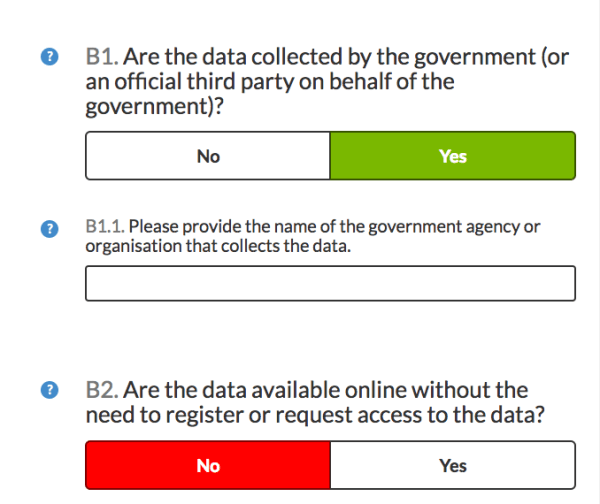
In 2016 we upgraded the open data census and created a new survey platform. We improved the survey user experience with a new look and feel. We also applied this design change to all of our Local Open Data Index instances as well.
We have been experimenting with a new schedule of submitting to the Index, starting in November and finishing in January. With over 90 countries already submitted, we are now in the process of the review phase. Mark your calendars! We are aiming to publish the Index results on May 2nd, 2017.
OpenTrials
OpenTrials is a collaboration between Open Knowledge International and Dr Ben Goldacre from the University of Oxford’s Evidence-Based Medicine Data Lab. It aims to locate, match, and share all publicly accessible data and documents, on all trials conducted, on all medicines and other treatments, globally. OpenTrials launched in beta at the World Health Summit in October 2016. Anyone can now visit OpenTrials.net to find out more or go to explorer.opentrials.net to test out the OpenTrials search tools and API.
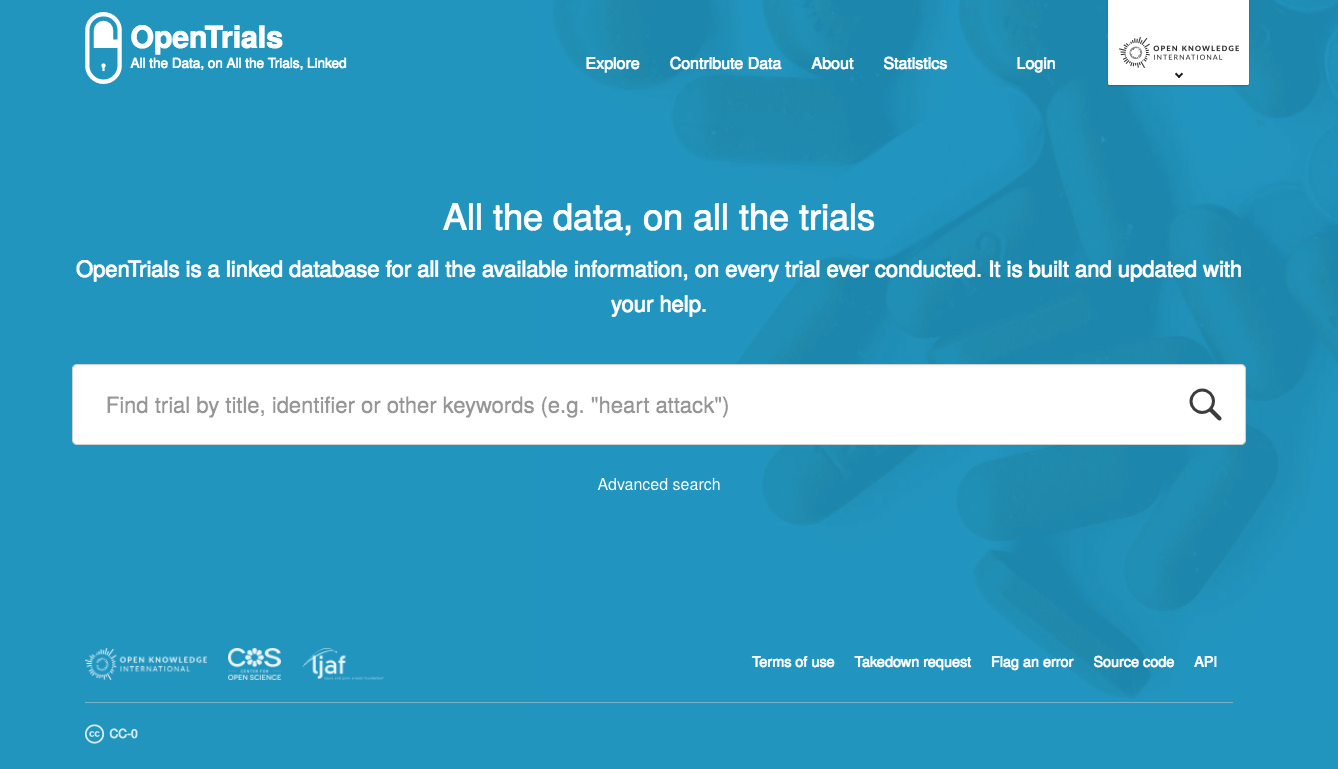
The OpenTrials team also built the OpenTrials FDA prototype - created in partnership with Dr Erick Turner of Oregon Health and Science University. ‘OpenTrials FDA was one of three finalists competing for the 2017 Open Science Prize. More details on the Open Science Prize can be found on our blog’
Frictionless Data
Frictionless Data is about removing the friction in working with data and is a technical approach based on the Data Package standard— a containerization format built around existing practices for publishing open-source software. 2016 was the first year of a two-year grant from the Sloan Foundation to explore the use of Data Packages in research.
A major milestone for the project this year was the development of v1.0 of the Frictionless Data Specifications which was the result of the collaborative working group established to complete the task. We have built core libraries in Python and JavaScript, complemented by additional libraries in R and Ruby, built and maintained by our technical partners. This year saw the continued development of key tools for reducing the friction in working with data including Good Tables and The Data Quality Dashboard.
We have embarked on pilot partnerships with organisations including DM4T, The Pacific Northwest National Laboratory and The Western Pennsylvania Regional Data Center in order to trial our approach and tooling. We were co-organisers of csv,conf,v2 in Berlin in May, and hosted a hackathon which gave us the chance to give hands-on support to those interested in learning more about the project. We also co-organised a session at SciDataCon in Denver, USA, to share perspectives on barriers to data sharing with the research data community and present work on the project.
Frictionlessdata.io has been launched as a home for the project and includes an extensive set of tutorials and case studies designed to give people access to everything they need to know about the project.
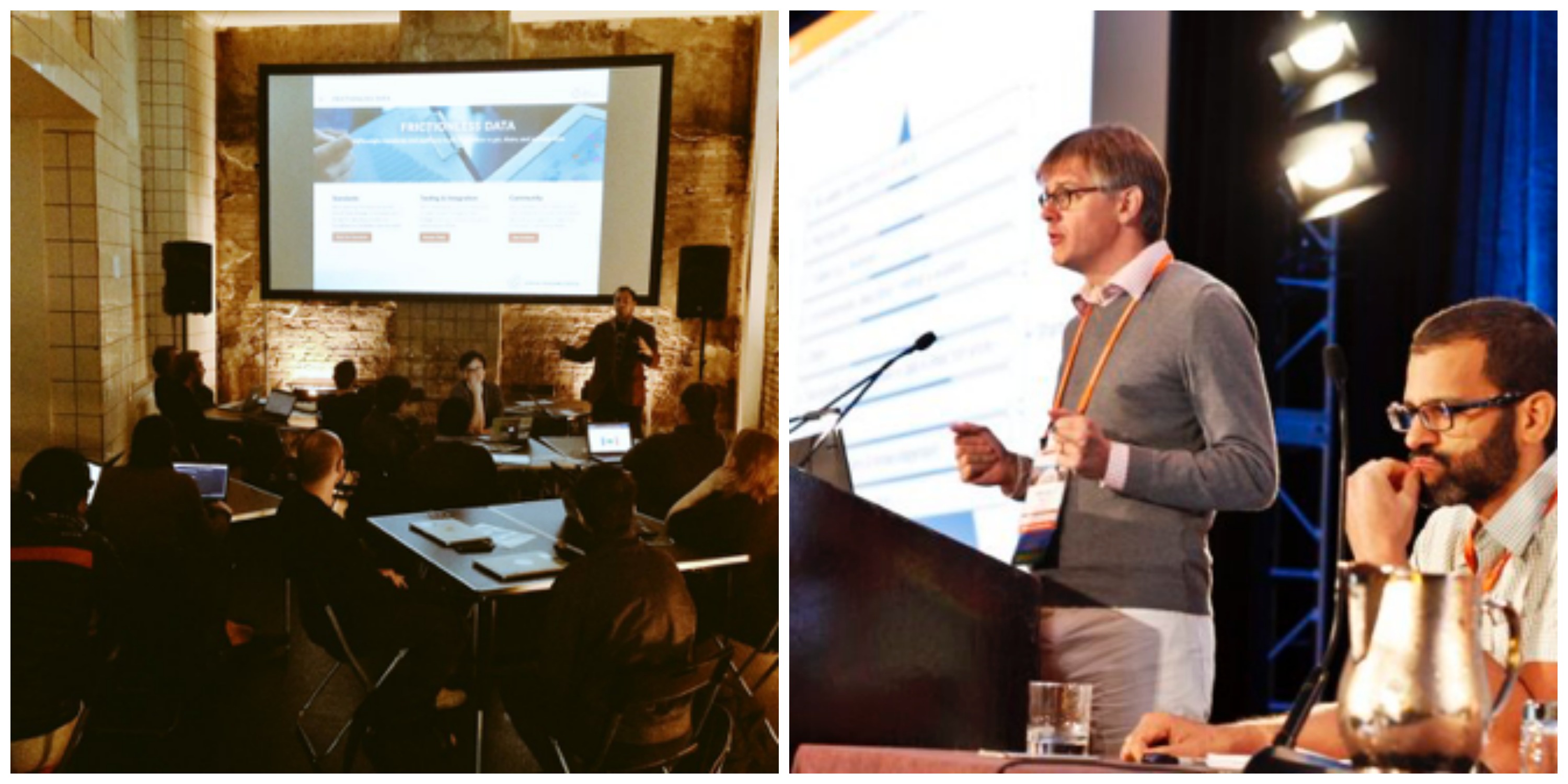
Open Spending
OpenSpending is a free and open platform for citizens looking to track and analyse public fiscal information globally. In 2016, OKI launched the new OpenSpending Next website. The new OpenSpending platform was presented at several data events and conferences across Europe we held several calls with different Open Knowledge Network chapters to introduce the new OpenSpending tools.
OKI collaborated with the Global Initiative for Fiscal Transparency (GIFT) and the World Bank Boost Initiative to develop the Fiscal Data Package, a specification that enables the publishing and consuming of fiscal data. As a direct result of this collaboration, OKI piloted the Fiscal Data Package with the Federal Finance departments of four different countries (Mexico, Uruguay, Guatemala and Croatia).
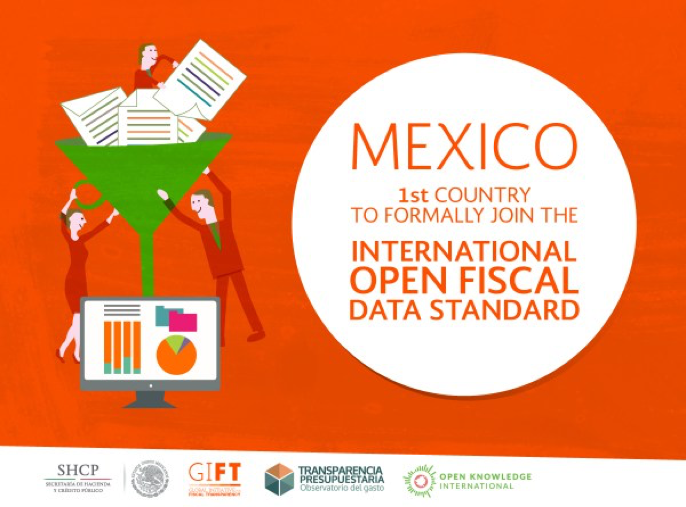
In the last year OpenSpending has strengthened its ties with the fiscal data team at OKFN DE to work on increasing fiscal transparency in the EU. This resulted in subsidystories.eu, a project funded by Adessium. The goal is to increase transparency in the EU by unravelling how the European Structural Investment Funds are being spent at the local level.
OKI’s involvement in the Horizon 2020 project OpenBudgets.eu has lead to several technial and non-technical contributions in an endeavour that involves 9 organisations across Europe. OpenBudgets.eu will provide an open-source software framework and accompanying SAAS (Software-As-A-Service) platform for supporting financial transparency, thus enhancing accountability within public sectors, and as a result preventing corruption.
School of Data
School of Data has both grown and matured in 2016. It has grown with the addition of 4 new official member organisations from South Africa, Nigeria, Turkey and Latvia. It has launched projects with several new partners (including DataShift, NRGI, Internews). And the School of Data network has seen an increase in activity through our Member Support projects.
School of Data has also matured in the last year with the redesign of the School of Data website and an update of its visual identity which highlights better our network, programmes and methodology. The School of Data Fellowship programme has continued to develop in 2016 with nine esteemed fellows from across the world tackling data literacy in different contexts.
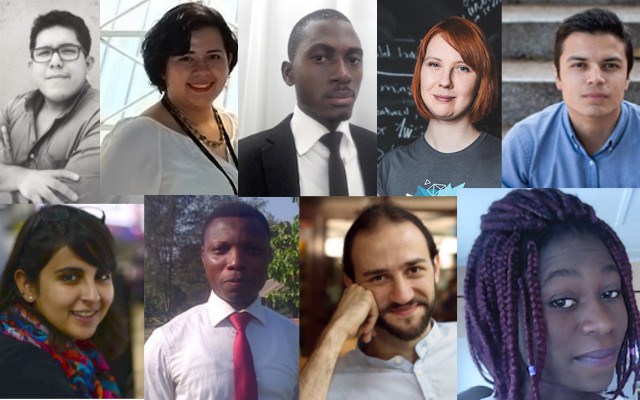
Through all this School of Data has kept its commitment to support CSOs and journalists across the world in order to increase their level of data literacy. School of Data has also kept its commitment to advancing knowledge about data literacy, unveiling at IODC 2016 the Data Literacy Activity Matrix, which describes the added value of different types of data literacy activities. In early 2016 we finalised our guide to mobile data collection produced as part of the 2015 Fellowship. In 2017 we’re launching our first official cohort of Data Experts, a programme similar to the Fellowship but which focuses on supporting high potential CSOs to grow their data capacity and deliver concrete data projects.
CKAN
2016 was an exciting year for CKAN, the open-source platform for sharing data. There were many new CKAN-powered portals announced, including high-profile ones like the European Data Portal, which harvests the metadata of Public Sector Information available on portals across all European countries. But we also saw CKAN being used in more and more different contexts, from environment data to regional hubs. 2016 also saw the release of a new stable version of CKAN, 2.6.0, which included several performance and bug fixes, and also new versions on several popular extensions.
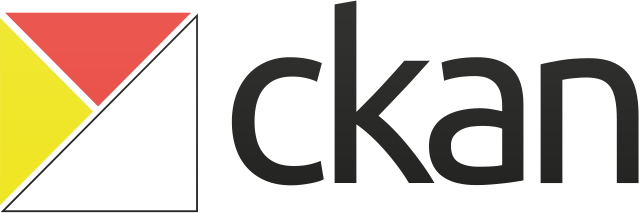
The main community event around CKAN was CKANCon, a one-day conference that took place as a pre-event of the International Open Data Conference in Madrid. More than 75 attendees gathered for presentations around CKAN use-cases and to take part in discussions around technical issues and the project’s future. The conference highlighted how CKAN is helping different organizations to publish data and build communities around it. All slides from the presentations are available on the event website and the recorded sessions are available in the IODC YouTube channel.
Open Knowledge International is part of the CKAN Association Steering Group and it is actively contributing to community building efforts around CKAN, helping onboarding new developers, writing documentation and drafting a roadmap for the next few years. The main goal of all these activities is to ensure a vibrant and active community around CKAN that will ensure its sustainability for years to come. Under-the-hood work is already underway in 2017 to migrate CKAN to a new, more modern and powerful web framework that will make contributions easier.
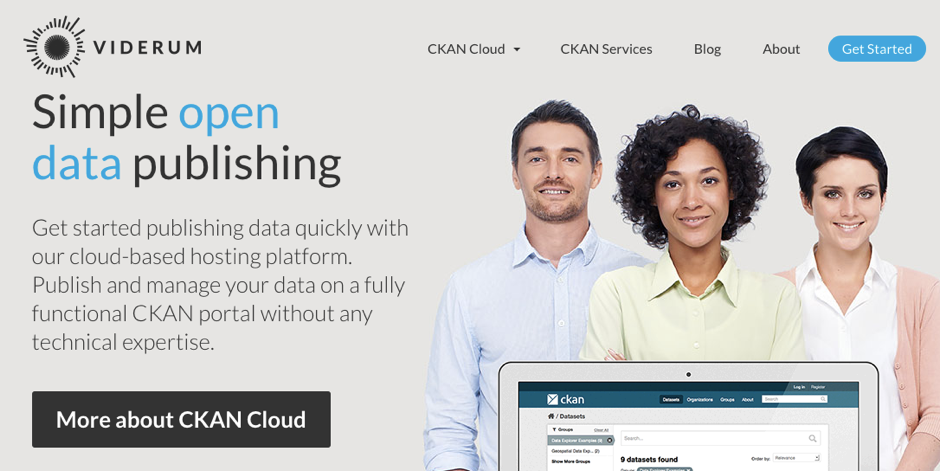
Introducing Viderum
In February 2016 we announced the spin-off of our commercial services division into its own company: Viderum. Viderum provides services and products for governments, institutions, and local authorities to publish open data. Specifically, they offer low-cost CKAN hosting on a scalable cloud-based infrastructure, CKAN technical support, custom open data website and CKAN extension development, and technical consulting related to open data.
The spin-off allows Viderum to lend a stronger focus to further development and promotion of these services without distracting from Open Knowledge International’s core mission of empowering civil society organisations to use open data.
Viderum’s mission is to make the world’s public data discoverable and accessible to everyone. Surpluses generated by Viderum flow back into Open Knowledge International to fund our nonprofit work.
Highlights from our collaborations
Route-to-PA
The ROUTE-TO-PA project – Raising Open and User-friendly Transparency-Enabling Technologies fOr Public Administrations – is an 11 partner network aiming to make it easier to socially interact online about open data. The main purpose is to engage citizens through a “purposeful and personalized relationship” between citizens and open public administration data.

Open Knowledge International is an active partner in this consortium, focusing on the provision of more open channels of communication between open data publishers and users. For example, the Social Platform for Open Data is a social media platform that allows for interaction over open data, including project collaboration, data visualizations and topical discussions. The Transparency Enhancing Toolset is a tool built on CKAN, which provides a central location for data publishers, especially local authorities, to publish datasets in the public interest.
ROUTE-TO-PA is currently working with Open Knowledge Network partners in France, Italy, Ireland and the Netherlands. The team is also working with School of Data to run data expeditions on the ROUTE-TO-PA tools to help build communities on the platforms. We are looking forward to further engagement in 2017 with the Open Knowledge Network and our pilots over the use of these tools and platforms.
FIWARE
The FIWARE Community is an independent open community from across the European Union which aims “to build an open sustainable ecosystem around public, royalty-free and implementation-driven software platform standards that will ease the development of new Smart Applications in multiple sectors”. FIWARE provides a rich set of open standard APIs that make it easier to connect to the Internet of Things and process and analyse Big Data. Over the last two years, Open Knowledge International has partnered with FIWARE to integrate CKAN with the FIWARE platform, enabling users to catalogue, upload and manage open datasets and data sources and allowing Open Knowledge International to continue to develop CKAN into the leading open-source platform for sharing data.
The Right to Education Index
RTEI, a project of RESULTS Educational Fund, is a global accountability initiative that aims to ensure that all people, no matter where they live, can enjoy their right to a quality education. Open Knowledge International partnered with RTEI in 2016 to build an open tool that monitors the satisfaction of the right to education based on international human rights law frameworks. Working with civil society partners, RESULTS Educational Fund supports in-country and international advocacy based on findings from RTEI from 2015 and forthcoming findings in 2016. Advocates, researchers, and all citizens can use RTEI to engage in informed dialogue about the satisfaction of the right to education.
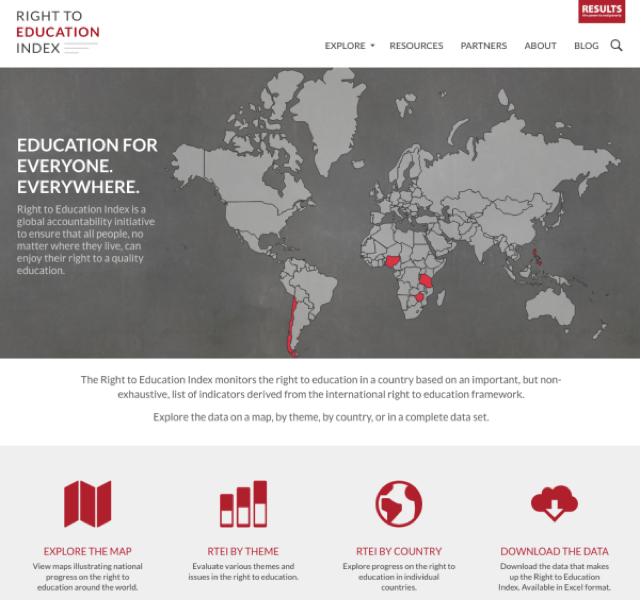
D-CENT
Open Knowledge International was one of nine partners in the multidisciplinary EU-funded project on Decentralised Citizens ENgagement Technologies (D-CENT). The project ran large-scale democracy pilots in Spain, Iceland, and Finland, leveraging existing network movements with an engaged user-base of tens of thousands of people. We specifically worked with our Finnish chapter, Open Knowledge Finland, who created a decentralised social networking platform for large-scale collaboration and decision-making in Helsinki, together with citizens and developers. The project ended in May 2016 with the successful Democratic Cities event in Madrid, where over 500 participants gathered to discuss and listen to speakers ranging from Manuela Carmena, mayor of Madrid, to Paul Mason and Julian Assange.
Future TDM
As the use of content mining is significantly lower in Europe than in countries in the Americas and Asia, the FutureTDM project is a consortium which seeks to improve uptake of text and data mining (TDM) in the EU. FutureTDM actively engages with stakeholders such as researchers, developers, publishers and small and medium-sized enterprises to help pinpoint why uptake is lower and to raise awareness of the value of TDM and to develop solutions. Open Knowledge International leads the work on communication, mobilisation and networking, and contributes to the research into best practices and methodologies.
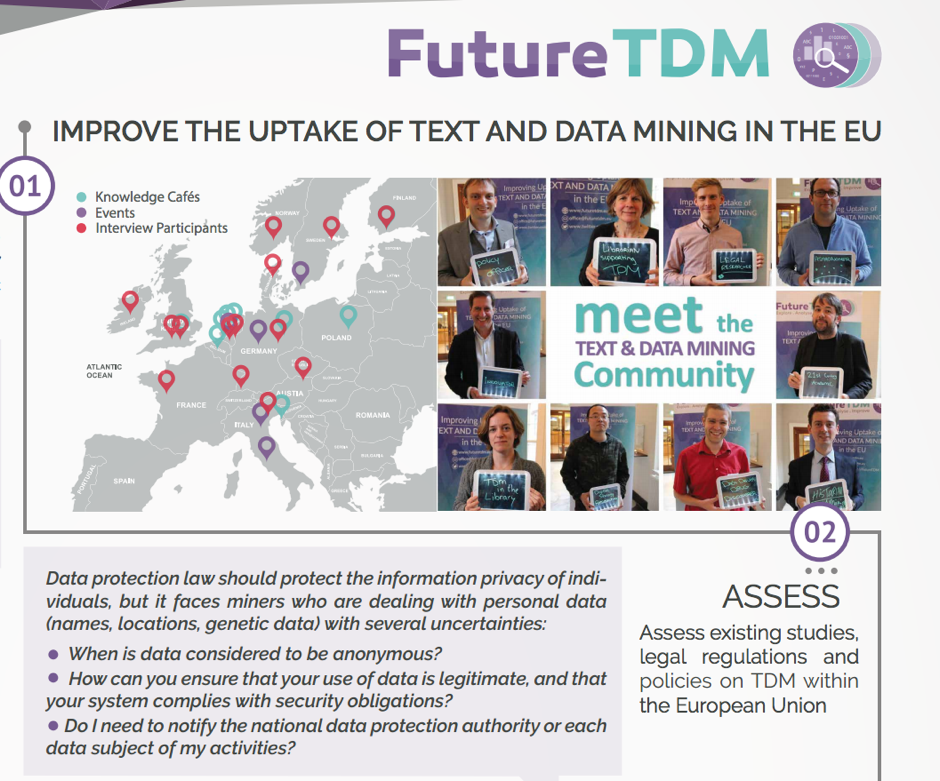
In 2016 the nine FutureTDM partners organized Knowledge Cafes across Europe as an informal opportunity to gather feedback on text and data mining from stakeholder groups working in the field. In September the first of two workshops was held to discuss the project’s findings in Brussels where many MEPs and policymakers were present. In addition, a platform was launched for sharing expert analysis, blogposts, policy recommendations, practitioner guidelines and other useful information.
In 2017 the FutureTDM project will analyse the findings for how to improve the uptake of text and data mining in Europe. The consortium will work together to develop and propose policy recommendations, guidelines, best practices and a roadmap for implementation, all of which will be made available to the general public through the website. The project will organise a final symposium to showcase the project results in the summer of 2017.
Open Data for Tax Justice
Launched in early 2016, the Open Data for Tax Justice network seeks to bring together people and organisations using open data to improve advocacy, journalism and public policy around tax justice. Coordinated by Tax Justice Network and Open Knowledge International, the partnership has focused its efforts on engaging with researchers, tax experts and activists interested in country-by-country reporting (CBCR) data.
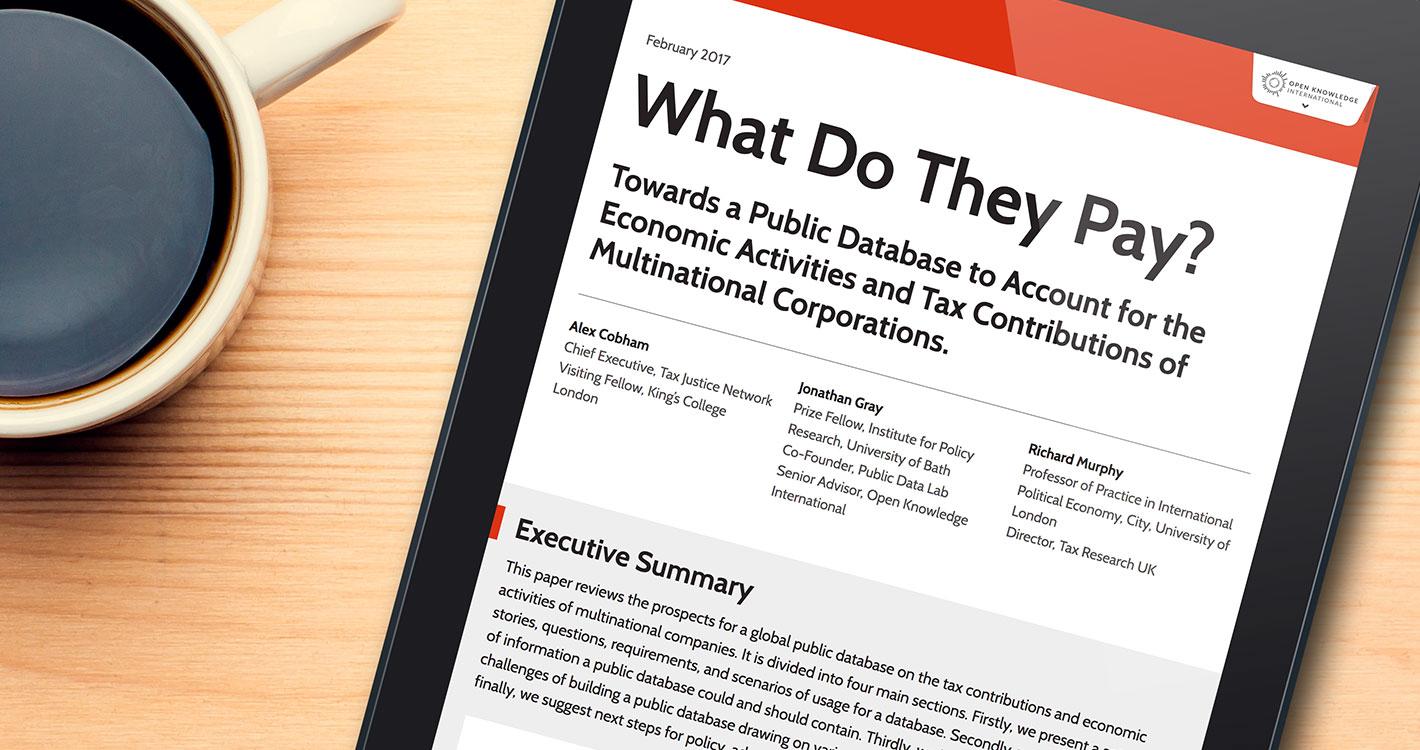
At a UK workshop held in Oxford in late October, experts with key experience on CBCR and related tax justice issues gathered to discuss a way to push for the release of more public CBCR data. The result of this workshop was a white paper co-authored by Alex Cobham (Tax Justice Network), Dr Jonathan Gray (University of Bath/Public Data Lab/Open Knowledge International) and Professor Richard Murphy (University of London/Tax Research UK) published in February 2017.
Alongside the white paper, Open Data for Tax Justice will be publishing a series of interactive visualisations of CBCR data in 2017 to help illustrate how having this information can be more useful to researchers, activists and governments.
Open Data for Development
Open Knowledge International is a member of Open Data for Development (OD4D), a global network of leaders in the open data community, working together to develop open data solutions around the world. Open Knowledge International manages the Africa Open Data Collaboration Fund and the OD4D Embedded Fellowship programme.
The Africa Open Data Collaboration Fund provides monetary and technical support to 6 civil society organisations in Africa working on different applications of Open Data to their work. The Embedded Fellowship programme places open data experts in various civil society organisations across Africa. In 2016, we partnered with Women Environmental Programme (WEP) in Abuja, Nigeria and with Oxfam in Kenya in Nairobi, Kenya.
Through our work with these partner civil society organisations, Open Knowledge International continues to learn more about what it takes to build open data capacity, how to provide effective support, and how best to demonstrate the value of open data in different civil society contexts.
New team members
In 2016, the Open Knowledge International team continued to grow. Here are the team members that joined in 2016:
- Stephen Abbott Pugh
- Vitor Baptista
- Georgiana Bere
- Anastasia Kalashnikova
- Shireen Kovoor
- Diana Krebs
- Ben Meghreblian
- Oscar Montiel
- Victor Nitu
- David Opoku
- Serah Rono
- Freyja van den Boom
- Franka Vaughan
- Sierra Williams
Network Highlights
Open Knowledge Network
In 2016 the Open Knowledge Network has continued to grow and we now have chapters and groups in over 40 countries. We announced new chapters in Japan and Sweden and we started the process of creating a local group in Colombia, as well as affiliated organisations and local groups from Panama, Mexico and Estonia. In an effort to make it easier for our community to interact and thrive, we created a new version of the Network Guidelines. The guidelines are designed to empower our Network take action to achieve local impact and collaborate further with like-minded communities around the world.
During 2017, we are looking to re-focus our Network strategy so that it effectively caters to the needs of the network in a more efficient way. Through this work, we expect to strengthen our existing relationships and to begin to lay the groundwork so the Network is more self-sustaining.
Open Knowledge International Events
Open Data Day: in 2016 we had our mini-grants scheme with ILDA. We had 60 applications and gave 35 grants. You can see events reports from Open Data Day on our blog. During December 2016 we worked on the Open Data Day website and gave it a makeover. Sign up your event for Open Data Day 2017 at opendataday.org
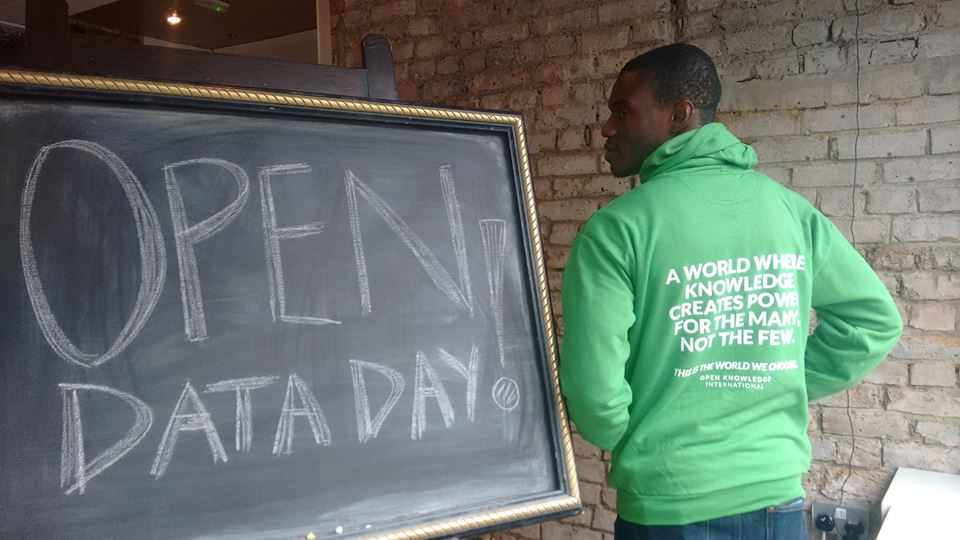
International Open Data Conference (IODC): In October, we hosted the IODC unconference - the Open Exchange for Social Change where people discussed how open data can create change. See the blog post about it. Help to shape the IODC roadmap by keeping the discussions going in 2017.
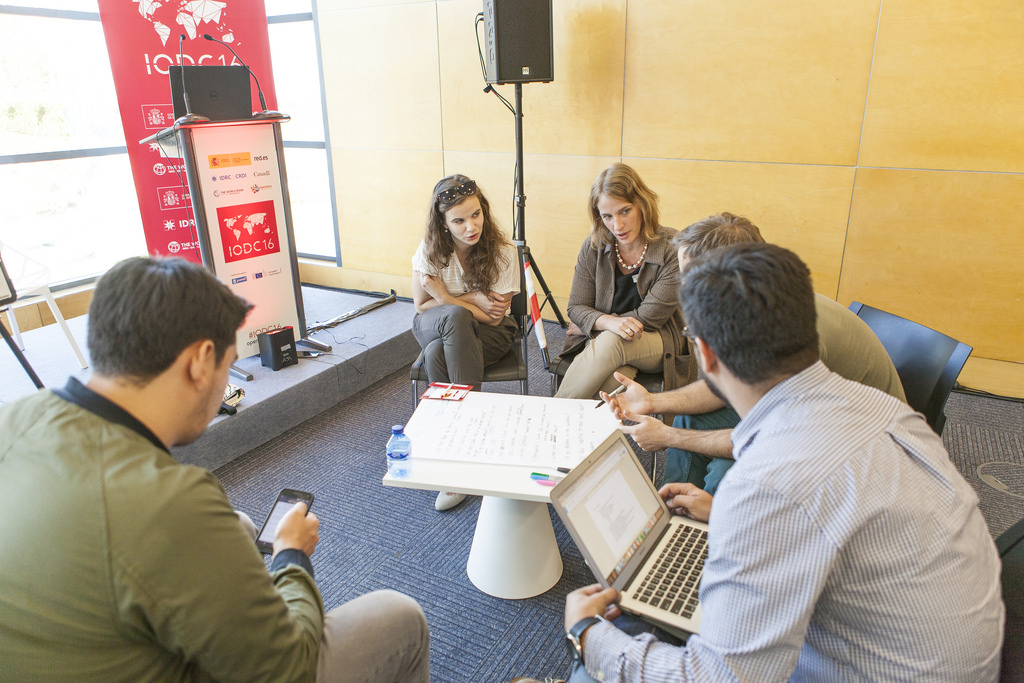
Open Knowledge Labs
Open Knowledge Labs exists at the interface between Open Knowledge International and its developer community. We communicate primarily through our Open Knowledge Labs blog, forums, and chat rooms. Historically, the blog has hosted tips and tricks for working with data from across our community. This past year, we have used the blog as the primary means of distributing new releases, tutorials, and walkthroughs from our Frictionless Data project.
We host monthly online “hangouts” which give participants the opportunity to ask questions, present their own open data projects, and build a sense of community. Over the course of 2016, 10 hangouts were held. The following events were particular highlights from the last year:
- The August 2016 Hangout featured Waylon Flinn, the developer of Dataship, a tool for sharing data analysis. He spoke about his tool and received feedback from the community.
- The October 2016 Hangout featured members of the OpenSpending team and provided participants with an overview of progress to date and future plans
- In December 2016, we featured a Frictionless Data pilot partner, Samuel Payne of the Pacific Northwest National Laboratory. He talked about his tool for doing collaborative biological data analysis backed by GitHub
Research Highlights
As more and more citizens and NGOs look to incorporate data-driven practices, a number of exciting opportunities and partnerships are opening up for the open data environment. Our research in the last year underlines the importance of these developments. Here is a brief overview of our research activity from 2016:
- Briefing Paper: Infrastructures for Open Scholarly Communication
- Changing What Counts: How Can Citizen-Generated and Civil Society Data Be Used as an Advocacy Tool to Change Official Data Collection?
- Three-part research series on Citizen-Generated Data, in collaboration with the CIVICUS initiative DataShift:
- “Making citizen-generated data work”
- “From Evidence to Action”
- “Acting locally, Monitoring globally”
- Research on the impact of opening data in cities and how to make make public data infrastructures more attuned to civil society
- How to measure sustainable development from the bottom-up
- Controversy mapping and stakeholder mappings for OpenBudgets.eu and Opentrials
- IODC Session: How to advance open data research: Towards an understanding of demand, users, and key data
- Research partnership with the Open Governance Research Exchange (OGRX)

In 2017 we look forward to expanding our portfolio of research around different use cases of open data, types of organisations using open data and contextual/environmental factors enabling effective use of open data.
Multimedia
- OpenTrials beta walkthrough OpenTrials beta walkthrough
- OpenTrials Walkthrough OpenTrials Walkthrough
- OpenTrials: what, why and how? OpenTrials: what, why and how?
- FutureTDM YouTube channel FutureTDM YouTube channel
- CKAN demo CKAN demo
- FutureTDM Knowledge Library FutureTDM Knowledge Library
- Dan Fowler and Rufus Pollock: Frictionless Data Dan Fowler and Rufus Pollock: Frictionless Data
- Rufus Pollock Rufus Pollock
- How about ROUTE-TO-PA? How about ROUTE-TO-PA?
Looking ahead to 2017
Our Mission
To Empower Civil Society Organisations to use Open Data to improve people’s lives
Having access to data is a vital step for social progress. But open data is only valuable insofar as the data is actually relevant and useful. In the next phase of our work, Open Knowledge International will go beyond opening up data in order to focus on realizing data’s value to society. Put in one phrase, Open Knowledge International will empower Civil Society Organisations to use Open Data to improve people’s lives. You will hear more from us in the coming months on our strategic priorities and how we are developing partnerships with organisations to fulfill our mission.
Future directions for 2017
A number of new strategic development are underway as we look to lay the groundwork for fully incorporating our mission into all of our activities. We will be 1.) looking to demonstrate the value of open data for civil society; 2.) we will be providing organisations with the tools and skills to use open data; and, 3.) we will be working to facilitate productive dialogue between governments and civil society over the provision of useful data.
One primary issue we will be tackling at Open Knowledge International over the next year is the quality of open data currently published. Rather than focusing on the proliferation of available datasets on the web, we will be investigating further into data standards for different types of data to ensure the usefulness of published data continues to grow.
Open data is already being used in many different contexts to improve people’s lives and we will continue to communicate how. With public trust in institutions facing a serious decline, 2017 is the ideal time for the open data community to work with civil society leaders and demonstrate how information can be used to drive change and build trust across divisions in society.
We will be engaging further with users and potential users of data in 2017 to facilitate dialogue with governments and other data publishers to ensure the information they are providing is the information citizens require. We look forward to the results of the Global Open Data Index in the coming months on which areas require pressing attention and we will be looking to develop new collaborations with NGOs and data experts around the world to address local, national, and transnational issues.
Also, be sure to keep your eyes out for news about the next Open Knowledge Festival (OKFest) - a chance to bring together the community and discuss all the intersections of our work. In 2014, over 1000 people from 60 countries came together to discuss, share, think, and collaborate over how to translate Open Minds to Open Action. We’ll be looking to build on this format and create a great community event for all!
How to get involved
- Over 2,200 people are members of the Open Knowledge Discuss Forum - join the discussion here!
- Looking to get hacking? Open Knowledge Labs is a community of civic hackers, data wranglers and ordinary citizens making tools and insights using open data, open content and open code. Join in!
Our community is what keeps us motivated! We want to keep you informed of what we’re working and hear what you’ve been up to. Check out the Discourse Forum for more.
We’d love to hear from you on our social media channels, including our Facebook and Twitter.